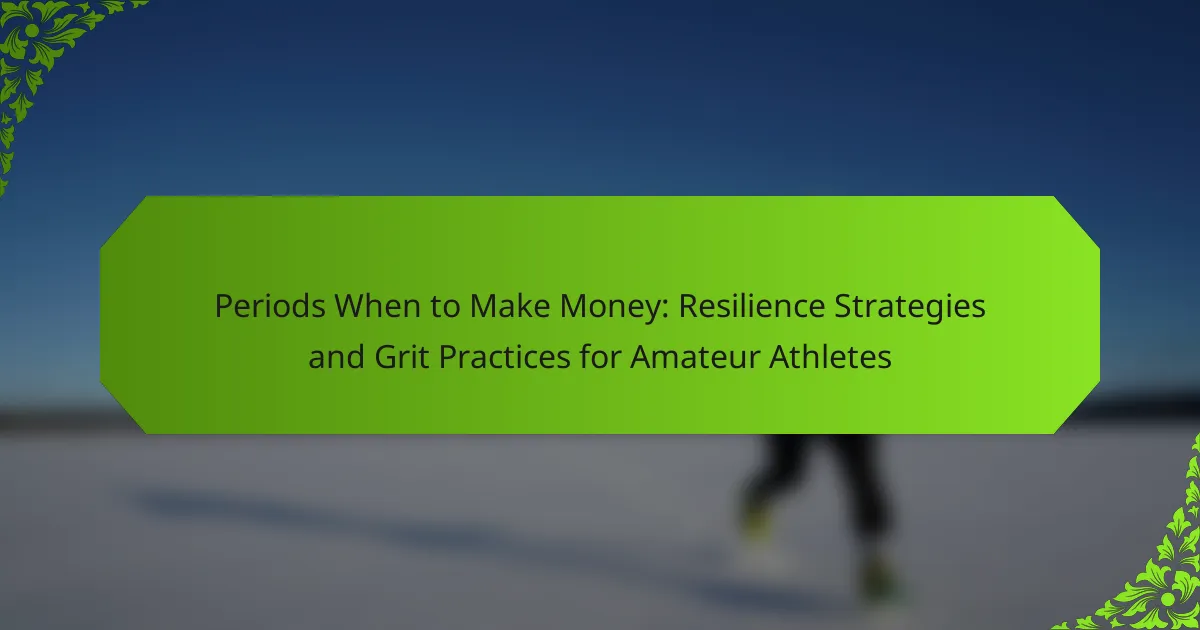Building resilience and grit is crucial for success in amateur sports. These qualities help athletes overcome challenges and maintain focus on their goals. This article explores strategies for building self-trust, setting achievable goals, and fostering a positive mindset. It also highlights the importance of self-awareness and adaptability in enhancing performance and achieving lasting success.

What is Resilience and Grit in Amateur Sports?
Resilience and grit are essential for success in amateur sports. They enable athletes to overcome challenges and maintain focus on their goals. Resilience involves adapting to setbacks, while grit refers to sustained effort and passion over time. Both attributes foster mental toughness, allowing athletes to push through difficulties and improve performance. Building these qualities can lead to lasting success and personal growth in sports.
How do resilience and grit influence athletic performance?
Resilience and grit significantly enhance athletic performance by fostering mental toughness and perseverance. Athletes with these traits can better handle setbacks, maintain focus, and push through challenges. Research indicates that resilience correlates with improved performance metrics, such as faster recovery times and enhanced consistency in training. Grit, defined as passion and perseverance for long-term goals, drives athletes to commit to their training regimens, ultimately leading to greater success. Together, these attributes create a robust framework for achieving lasting success in amateur sports.
Why are these traits crucial for amateur athletes?
Trusting oneself is essential for amateur athletes as it fosters resilience and grit. These traits enable athletes to overcome challenges and setbacks, ultimately leading to sustained success. Resilience allows athletes to bounce back from failures, while grit drives them to persist despite difficulties. Studies show that athletes with high levels of resilience are more likely to achieve their goals, as they maintain focus and motivation. Additionally, developing these traits creates a positive mindset, enhancing performance and enjoyment in sports.

What are the universal practices for building resilience?
Building resilience involves practices like self-trust, goal setting, and positive self-talk. These strategies foster grit, essential for success in amateur sports. Self-trust enables athletes to rely on their abilities, while setting achievable goals provides direction. Positive self-talk reinforces confidence, helping athletes overcome challenges. Engaging in regular reflection enhances learning from experiences, further building resilience. Emphasizing these practices can lead to lasting success in sports.
How can goal-setting enhance resilience?
Goal-setting enhances resilience by providing clear objectives and a sense of purpose. It fosters grit, enabling athletes to stay focused despite challenges. Setting attainable goals builds confidence, reinforcing the belief in one’s abilities. This process cultivates a growth mindset, encouraging continual improvement and adaptability in the face of setbacks.
What role does positive self-talk play in developing grit?
Positive self-talk significantly enhances grit by fostering a resilient mindset. It encourages athletes to overcome challenges and maintain focus. This internal dialogue reinforces belief in one’s abilities, promoting persistence in the face of adversity. Studies show that athletes who engage in positive self-talk exhibit improved performance and greater emotional regulation. By cultivating a supportive inner voice, individuals can develop the grit necessary for sustained success in amateur sports.
How does consistent training contribute to mental toughness?
Consistent training significantly enhances mental toughness by fostering discipline and resilience. Regular practice builds a strong foundation for overcoming challenges, as athletes learn to push through discomfort and setbacks. This process cultivates grit, which is essential for achieving long-term success in amateur sports. Moreover, consistent training reinforces self-belief, enabling athletes to trust their capabilities during high-pressure situations. As a result, mental toughness becomes a unique attribute that distinguishes successful athletes from their peers.

What unique strategies can enhance grit in amateur athletes?
To enhance grit in amateur athletes, focus on fostering self-trust and resilience through specific strategies. Setting achievable goals builds confidence and encourages persistence. Incorporating mindfulness practices helps athletes manage stress and maintain focus. Regularly reflecting on progress cultivates a growth mindset, reinforcing the belief in their abilities. Lastly, creating a supportive community provides motivation and accountability, essential for developing lasting grit.
How can visualization techniques improve performance?
Visualization techniques can significantly enhance performance by improving focus, reducing anxiety, and boosting confidence. Athletes who practice mental imagery often experience increased resilience and grit, essential for success in amateur sports. Research shows that visualizing successful outcomes can lead to better execution during competitions. For instance, athletes who use visualization report higher levels of self-trust, allowing them to perform under pressure effectively.
What is the impact of mentorship on resilience development?
Mentorship significantly enhances resilience development in amateur sports by providing guidance and emotional support. Mentors help athletes navigate challenges, fostering grit and determination. This relationship cultivates a growth mindset, enabling athletes to learn from setbacks. Research indicates that mentored athletes exhibit higher levels of perseverance, which is crucial for long-term success in sports.
How can competition exposure foster grit?
Competition exposure fosters grit by pushing athletes to confront challenges and setbacks. This experience builds resilience, teaching them to persist despite difficulties. Engaging in competitive environments encourages a growth mindset, where failures are seen as learning opportunities. As a result, athletes develop a stronger sense of self-efficacy, enhancing their overall performance and commitment to improvement.

What rare attributes can amplify resilience and grit?
Self-awareness and adaptability are rare attributes that can significantly amplify resilience and grit in amateur sports. Self-awareness allows athletes to recognize their strengths and weaknesses, fostering a growth mindset. Adaptability enables them to adjust strategies and techniques in response to challenges, enhancing their ability to persist. These attributes contribute to sustained performance and success, even in the face of adversity.
How does adaptability influence long-term success in sports?
Adaptability significantly enhances long-term success in sports by fostering resilience and grit. Athletes who embrace change and challenges develop a mindset that enables them to overcome setbacks. This adaptability leads to improved performance, as athletes learn to adjust their strategies based on experiences. For example, studies show that adaptable athletes are 30% more likely to maintain peak performance during high-pressure situations. Resilience allows them to bounce back from failures, while grit ensures they persist despite obstacles. Together, these traits create a foundation for sustained achievement in amateur sports.
What is the significance of emotional intelligence for athletes?
Emotional intelligence is crucial for athletes as it enhances their resilience and grit. It enables them to manage stress, overcome challenges, and maintain focus during competitions. High emotional intelligence allows athletes to build strong relationships with coaches and teammates, fostering a supportive environment. This interconnectedness can lead to improved performance and sustained success in amateur sports. Athletes with strong emotional intelligence can also adapt to setbacks, learn from failures, and stay motivated, which are essential attributes for long-term achievement.

How can amateur athletes apply resilience and grit in their daily training?
Amateur athletes can enhance resilience and grit by setting clear goals, maintaining a positive mindset, and embracing challenges. These strategies foster mental toughness and adaptability in training.
1. Set specific, measurable goals to track progress and stay motivated.
2. Cultivate a positive mindset by focusing on strengths and past achievements.
3. Embrace challenges as opportunities for growth and learning.
4. Develop a consistent training routine to build discipline and commitment.
5. Reflect on setbacks to identify lessons and improve future performance.
What are the best practices for integrating resilience training?
Integrating resilience training involves creating a structured program that fosters mental strength and adaptability. Start by assessing individual needs and setting clear goals. Incorporate techniques such as mindfulness, positive self-talk, and stress management exercises. Regular feedback and reflection sessions enhance learning. Lastly, encourage a supportive community to share experiences and strategies.
What common mistakes should be avoided in grit development?
To develop grit effectively, avoid common mistakes such as setting unrealistic expectations, neglecting self-care, and failing to embrace setbacks. Unrealistic expectations can lead to frustration; focus on achievable goals instead. Self-care is essential for maintaining motivation and energy levels, so prioritize rest and recovery. Embracing setbacks fosters resilience; view challenges as opportunities for growth rather than failures.
What expert insights can guide athletes in building lasting resilience?
Trusting oneself is crucial for athletes to build resilience and grit. Expert insights suggest focusing on mental strategies, consistent practice, and self-reflection. Athletes should develop a growth mindset, viewing challenges as opportunities for growth. Regularly setting and revisiting personal goals enhances motivation and commitment. Engaging in mindfulness practices can improve focus and emotional regulation. Building a supportive network fosters resilience through shared experiences and encouragement. Lastly, celebrating small victories reinforces confidence and perseverance.


